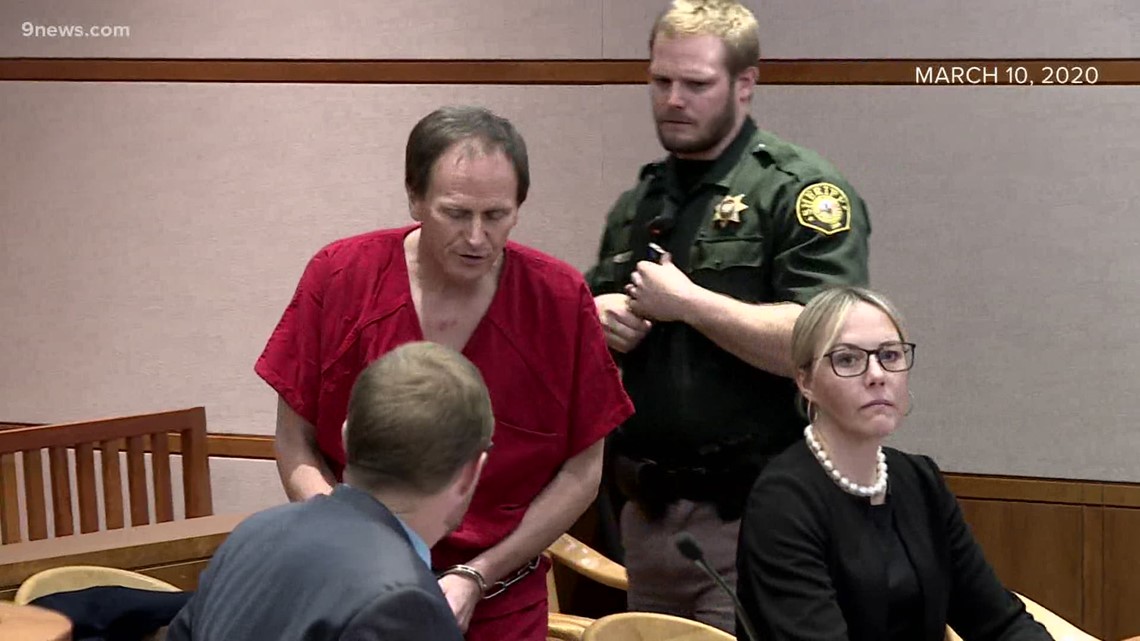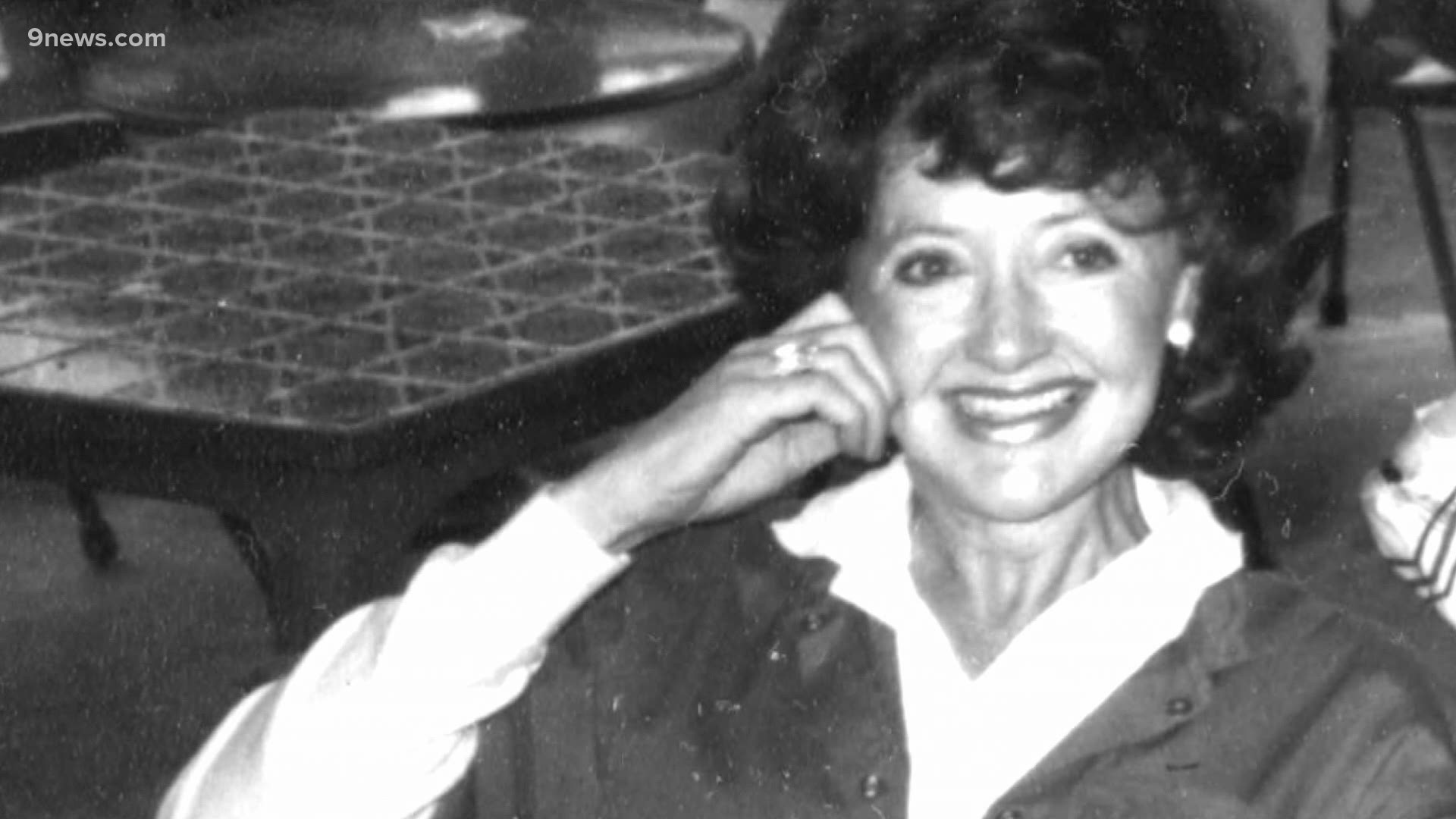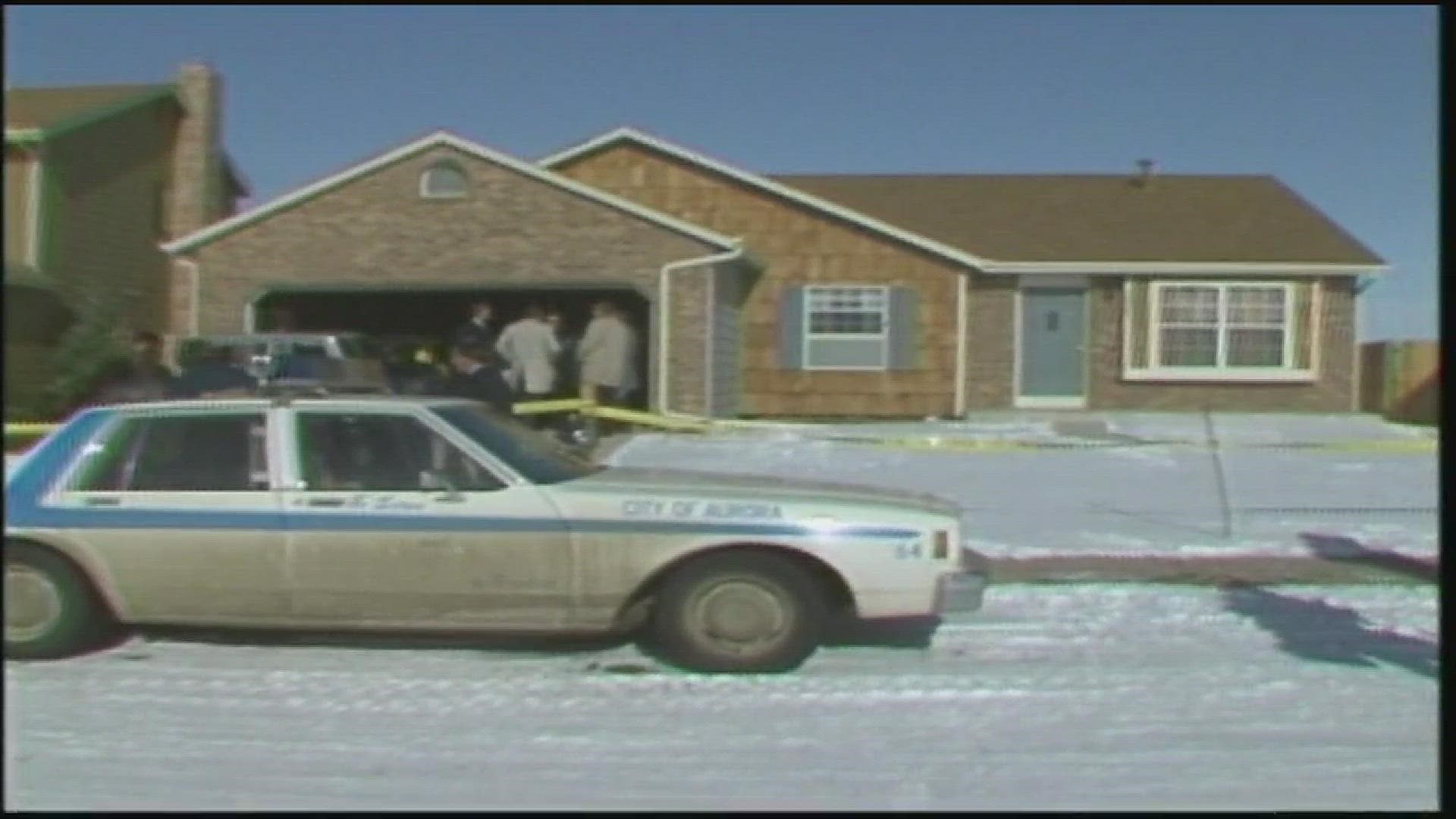ARAPAHOE COUNTY, Colo. — For more than an hour Wednesday morning, 87-year-old Connie Bennett answered questions about the worst day of her life – the snowy Monday morning in January 1984 when she entered the home of her son’s family and found an unimaginable scene of violence.
She’d driven to the Aurora home that day gripped with worry because her son and daughter-in-law, Bruce and Debra Bennett, hadn’t shown up for work.
When she’d pulled up, she testified, the garage door was standing open. Then she’d found the door from the garage into the home ajar and stepped through it, coming almost immediately to the body of her son.
“He was lying on his back, and he only had his briefs on, and I went over to him and fell to my knees, and I was asking what happened,” Bennett said. “And I could see – I could see that he was already gone.”
“You say gone?” District Attorney John Kellner asked gently.
“He was dead.”
But the horror was even worse.
Connie Bennett’s daughter-in-law and 7-year-old granddaughter, Melissa, had also been murdered. Her 3-year-old granddaughter, Vanessa, had been beaten so savagely she was barely alive.
Though no murder weapon was found, a coroner concluded they were attacked with a claw hammer. The killer also slashed Bruce Bennett’s throat.
Connie Bennett’s testimony came in an unusual hearing for Alex Christopher Ewing, the man identified as the suspect in the killings through a DNA hit in the summer of 2018.
RELATED: Judge: Hammer murder suspect won't face death penalty in 1984 killings of 3 members of family
Ewing is scheduled to go on trial in April on multiple counts of first-degree murder.
But the case has been beset by delays – and it’s possible there could be more – so Arapahoe County District Judge Michelle Amico allowed the testimony of several older witnesses now. If any of them are not available to testify when the trial is held, the videotaped testimony recorded Tuesday could be used.
Ewing, 60, was serving a long prison sentence in Nevada for an attack later in 1984 on a Henderson couple when a DNA hit identified him as the suspect in the Bennett murders and in the killings of Patricia Louise Smith in Lakewood a week earlier.
No trial date has been set in the Smith case.
Connie Bennett has been the public face of her family’s tragedy for 37 years.
Wednesday, she recounted the events leading up to the heart-breaking discovery.
The previous evening, family members had gathered at Bruce and Debra Bennett’s home to present Melissa a birthday present. She was to turn 8 in a couple of days.
“I bought a little organ for Melissa,” Connie Bennett testified. “I showed her how to play it. She enjoyed the piano and organ that I had at my house.”
There was nothing out of the ordinary about the evening, she said.
“There was a small little chocolate cake they put in the microwave, and we had some ice cream, and we sat around and talked,” she testified.
Around 9 p.m., Connie Bennett and two of her other sons left through the garage.
“Bruce came out through the garage and said goodbye, and the garage door was still open when we left,” she testified.
The next morning, Bennett said she was at work when she got a call from the furniture business where Bruce and Debra worked. They hadn’t shown up that morning, and no one had been able to reach them.
“I tried calling their house, and there was no answer,” Connie Bennett said. “I tried several times and there was no answer, so I decided to go out there and see if there was a problem.”
That’s when she found her son’s body and called 911.
“It looked like he had been hit in the forehead area, because he was lying on his back and his forehead was all beat up,” she testified. “I didn’t see anything else, except there was a lot of blood.”
At that point, Kellner, the prosecutor, handed her a photograph.
“I’m sorry to ask Miss Bennett,” he said, “is that the condition you found your son on Jan. 16, 1984?”
“Yes,” she answered quietly, then took some time to compose herself before describing her call for help.
“I just remember saying that my son is dead, and I remember saying – they asked if I could do CPR, and I didn’t know how to do that, and I said he’s cold,” she testified. “I just didn’t know what to say, except that they asked for the address to the house, and I couldn’t remember, so I ran outside through the garage and looked at the address and ran back in and told them.”
She described staying on the phone until the first officers arrived.
“They picked me up by the elbows on each side and just more or less carried me out of the house on a police car,” she testified. “I was so distraught and confused – the worst thing that ever happened.”
She also described the injuries suffered by her younger granddaughter, Vanessa, who suffered serious head injuries and has lived a difficult life.
“I didn’t see her until she was in the hospital,” Connie Bennett said. “She was in intensive care. She had tubes going in and out of everywhere. And she was covered with bandages.”
And finally, Kellner asked her to turn and look at Ewing, who sat across the room.
“Do you recognize that man?” he asked.
“No,” she replied.
“From 1984?” he asked.
“No, I don’t,” she said.
“Do you recognize him as a friend or acquaintance of Bruce or Debra?” Kellner asked.
“No, I don’t,” she said.
“Do you recall ever seeing him at your son, Bruce, and Debra’s home?”
“No.”
In all, she spent an hour and seven minutes on the witness stand.
Defense attorney Katherine Spengler asked her several questions. Connie Bennett acknowledged that she’d listened to her 911 call with prosecutors the previous day and that she’d reviewed a transcript of her earlier testimony in the case.
Connie Bennet also told Spengler she knew nothing about a razor knife that is among the prosecution’s evidence.
Also testifying Wednesday was Wilson Egan, a longtime Aurora police officer. Under questioning from prosecutor Megan Brewer, he described in detail scores of crime scene photographs.
One of them showed a birthday card for Melissa Bennett that was spattered with blood.
Egan also identified numerous pieces of physical evidence: a broken spindle from a stairway, blood-soaked bedding, drapery and clothing; and that razor knife, which investigators believe the killer used to slash away Melissa Bennett’s pajamas.
Ewing, who was born in North Carolina and spent much of his childhood in northern California, had a series of petty crimes on his record when he arrived in Colorado in the summer of 1983. That’s when, according to court records, he obtained a Colorado driver’s license.
In addition to the Smith and Bennett murders, he is suspected in two other attacks in Aurora earlier that same month. The statute of limitations has run in both cases, and no charges will be filed in either.
On Jan. 4, 1984, a man attacked an Aurora couple as they slept, beating them with a hammer and then fleeing after he was challenged. Both suffered head injuries but recovered.


Late the night of Jan. 9, 1984, or early the next morning, a man attacked a flight attendant in the garage or her Aurora home, savagely beating and sexually assaulting her and leaving her for dead. She survived and recovered.
The next afternoon Smith was killed, and the following week the Bennetts were attacked.
According to court documents obtained by 9Wants to Know, Ewing was arrested in Kingman, Ariz., 11 days after the Bennett murders, accused of breaking into a home there and beating a man with a 25-pound rock. Because of overcrowded conditions at the jail in Kingman, Ewing was held for a time at a detention center in Utah.
On Aug. 9, 1984, Ewing was being transported from Utah back to Kingman for a court hearing when he ran off after jail deputies stopped the transport van in Henderson, Nev., for a bathroom break. That night, Ewing broke into a home in Henderson and attacked a couple with an ax handle, savagely beating them. He was arrested two days later, convicted of multiple charges and was still behind bars in that case when a DNA hit identified him as a suspect in the Colorado cases.
He fought extradition for more than a year and a half but was ultimately transferred to Colorado in late February 2020.
Ewing is due back in court Wednesday in the Bennett case. Testimony is expected from two more witnesses.
He’s scheduled to be arraigned Feb. 26 in the Smith case.
Contact 9Wants to Know investigator Kevin Vaughan with tips about this or any story: kevin.vaughan@9news.com or 303-871-1862.
SUGGESTED VIDEOS: Investigations from 9Wants to Know


